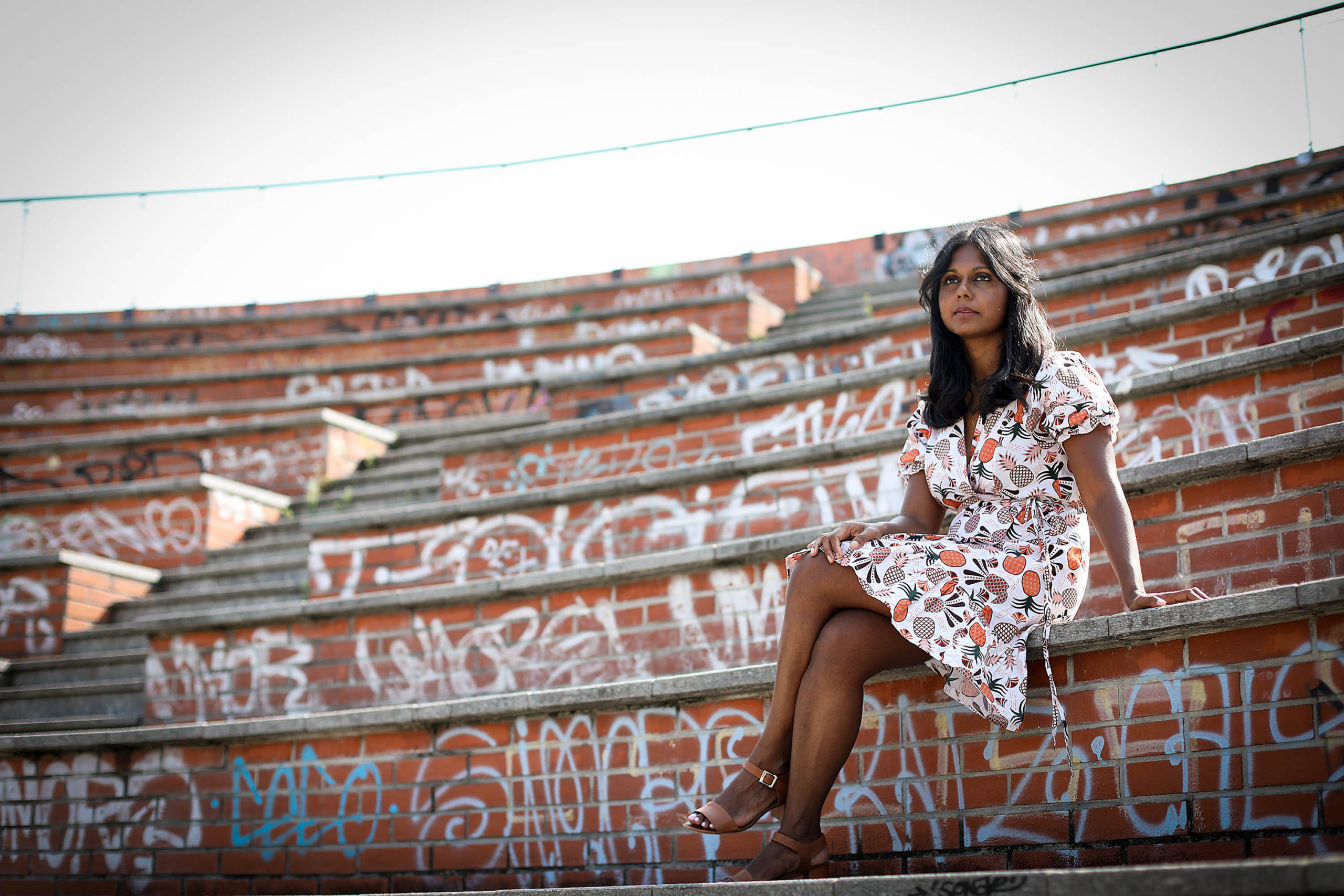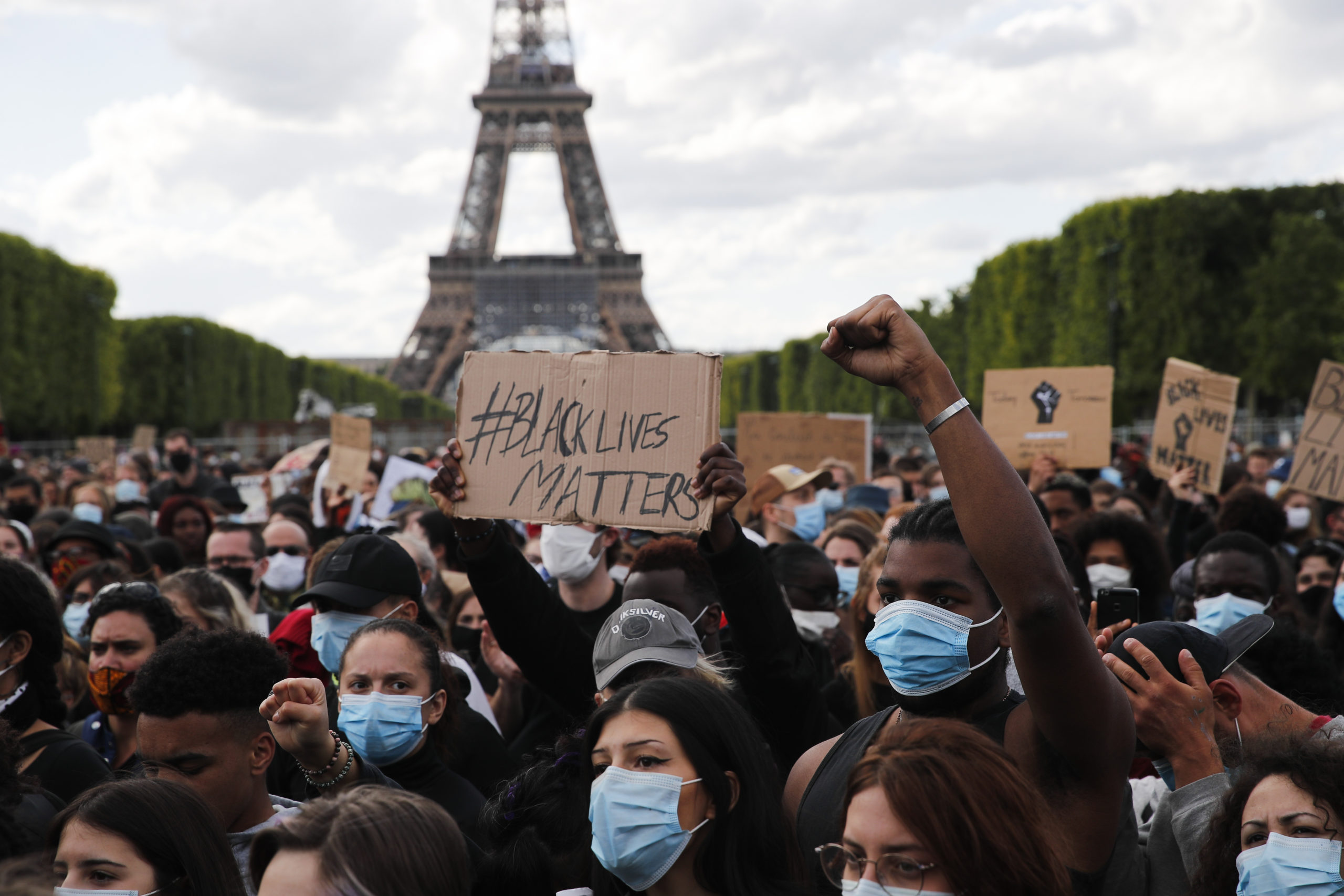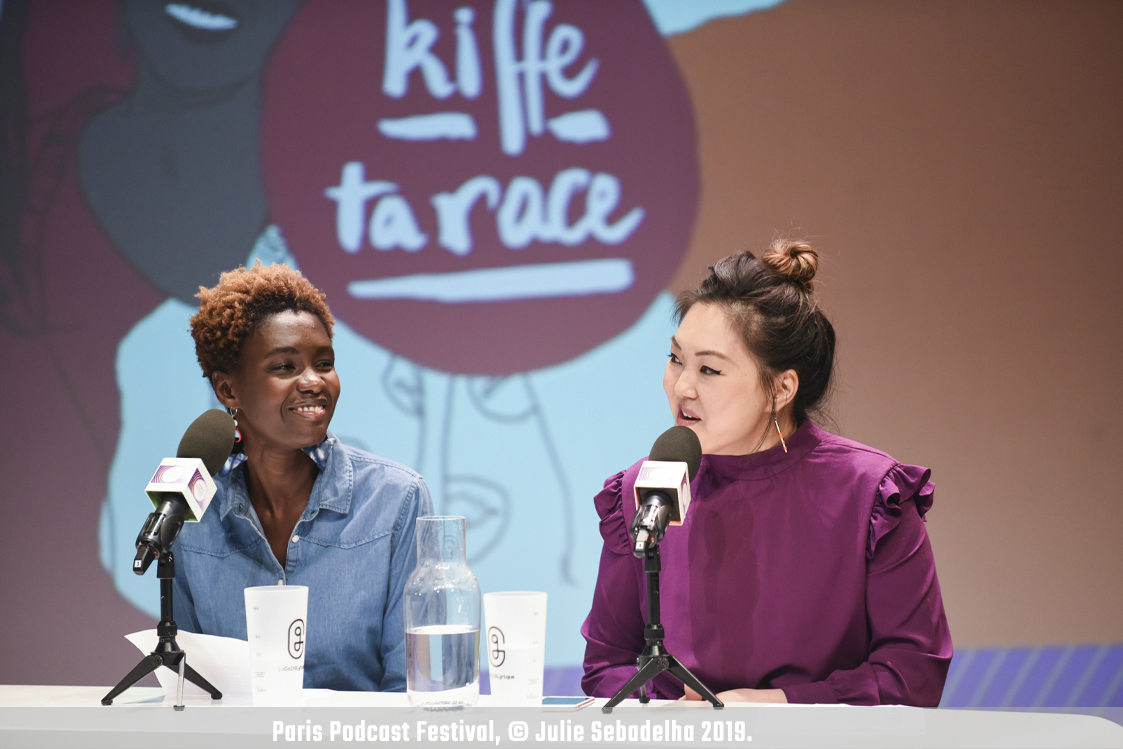
Nadeesha Uyangoda, a Milan-based writer, started the podcast "Sulla Razza" (About Race) in an effort to create a more robust vocabulary around race for Italian audiences
In the early summer of 2020, the Black Lives Matter protests unleashed after a Minneapolis police officer murdered George Floyd reached Europe, too.
During the protests, people filled the streets and squares across European cities to denounce systemic racism, chanting the popular Black Lives Matter refrain and holding signs that read “We can’t breathe either,” and “This is not an American thing,” as they defaced statues of the continent’s slave traders and colonizers of Africa and the Americas.
These protestors were not only calling out Europe’s colonial past — the centuries of subjugating non-white people in distant lands and extracting their resources. They were also taking aim at the racial tensions that have long simmered across the continent as decades of migration from those former colonies have been met by xenophobia and the rise of right-wing, nationalist political parties. About a third of African descendants recently polled by the European Union Agency for Fundamental Rights said they had been subjected to racial harassment, while 5 percent said they had been physically attacked. Earlier this year in Germany, politicians of Turkish and Syrian descent saw their campaign posters defaced with racist slurs and received death threats. In March, the Council of Europe’s Commissioner for Human Rights released a report noting that Portugal has seen a rise in hate crimes and speech targeting people of African descent. The recent racist abuse aimed at English soccer players following the team’s defeat in the Euro 2020 finals this past July is another example of how racial justice remains elusive in Europe.
Despite efforts to integrate minorities and their descendants within what has historically been mainly-white societies, racism has often been defined as a uniquely American problem. The lack of diversity in many European newsrooms exacerbates this problem, though some, particularly in the U.K., have started to realize the need to diversify their staff in order to appeal to a wider audience. Realizing its own lack of diversity, the BBC committed last year to creating a staff that’s at least 20 percent people of color, and other outlets across Europe have tried — at least on paper — to set similar targets. In 2019, Dutch journalist Hadjar Benmiloud opened Vileine Academy, a training program designed to give women of color the skills they need to compete for investigative journalism jobs. That same year, Deutsche Welle, the publicly-funded German international broadcasting outlet, created a diversity management position and has celebrated German Diversity Day through its programming. In October, the Guardian hired its first senior executive for diversity and development.
Within this ecosystem, podcasts have been popping up to fill the void of coverage of racism and race — and in some cases, starting the conversation around how to find the right words to discuss fraught topics in different languages. This piece will explore these themes through podcasts produced in Italy, Germany, and France.
Italy
A couple of months before the BLM protests erupted across Europe, Ariam Tekle, a 33-year-old Italian Eritrean anthropologist and documentary filmmaker, had launched her Black Coffee podcast on Black identities in Italy and was struggling to attract an audience. Suddenly, as people filled the streets demanding social justice, her listenership more than doubled, going from less than 1,000 to more than 2,000 listeners per episode, according to Tekle.
“People felt the need to educate themselves about topics that weren’t new to us but were to them,” says Tekle, whose parents immigrated to Italy from Eritrea in the 1970s. “With a mainstream media gap about racial debates in Italy, podcasts have become the go-to place for those looking for answers.”
The discussions Tekle and other podcasters have begun are wrapped up in Europe’s long history of colonialism and more recent influx of migrants. Between the 1960s and 70s, countries like France and Italy saw a wave of immigration from former African colonies, while Germany and the Netherlands, which had fewer colonies in Africa, saw an uptick in Turkish laborers attracted by the job opportunities.
Because of the lower barrier to entry, podcasts have become an important medium — especially for content creators outside the realm of traditional journalism — to connect with listeners on issues of race. Throughout the continent, podcast consumption in recent years has increased dramatically, particularly in countries like Spain, Italy, and France. According to 2018 data, in just a one week period, an average of almost 28 percent of adults in Europe listened to podcasts.
“The fact that the majority of race podcasts creators in Europe are not journalists is a strength, because what people want to hear now are those who often don’t have a voice,” says Rhoda Tchokokam, a member of the Black French artists collective Piment, which ran a live radio show about Black identities in France from 2017 to 2020. “And these platforms are the only resource to achieve that.”
In 2019, Tekle met Emmanuelle Maréchal, a French Cameroonian who had spent time in Italy as a student. Before meeting in person, the pair had been corresponding for some time about the challenges of growing up Black in their respective countries. It’s thanks to those discussions that they realized the importance of sharing their perspective with a larger audience and decided to co-found and co-host Black Coffee, through which they regularly entertain their audience for 30 minutes to over an hour. “The Italian mainstream media landscape is widely dominated by white people, so launching our own independent podcast was often the sole platform to share these conversations, to make them public,” Tekle says.
Although there are no official statistics on Italy’s newsroom diversity, a 2019 report by Associazione Carta di Roma, a journalism group monitoring immigration coverage in Italy, found that as few as seven percent of journalists had an immigrant background.
According to Tekle, this has contributed to coverage that depicts the BLM movement as a U.S. phenomenon that doesn’t apply to Italy. The lack of media diversity how it affects coverage of minorities is among the main topics discussed on Black Coffee. In April, for example, Tekle and Maréchal devoted an episode to Italian state TV Rai Italia and what they said was its complicity in portraying minorities in racist and stereotypical ways.

Hundreds of demonstrators gather on the Champs de Mars during a demonstration in Paris, France, to protest against the murder of George Floyd, a Black man killed by police in Minneapolis
In the episode, the two hosts addressed efforts within Italian TV to play down oft-used racist tropes targeting the appearance of minorities and the language barriers they face. The pair also tackled the recent use of blackface on Rai Italia and references to slanted eyes during shows on Mediaset, a commercial channel. The pair offered constructive suggestions, advocating for including minorities in the mainstream media dialogue. Their hope is that adding those voices will help educate more people about the struggles people of color face in Italy.
None of Rai Italia’s spokespeople responded to Black Coffee’s episode, nor did they comment on a subsequent campaign by activists to change its racist policies. However, in May, the organization apologized for the use of blackface in its shows and urged editors to not air shows with it, though did not ban the practice outright. Meanwhile, the conversation about the portrayal of minorities on Italian TV was reignited in September when two presenters from Italy’s commercial channel Mediaset won an innovation award despite being heavily criticized for the use of the n-word on their primetime program.
Podcasts like Black Coffee fill an important gap in conversations about race. For now, however, most rely on independent platforms for distribution so they can maintain their editorial independence from mainstream outlets — many of which haven’t sufficiently grappled with the racial and ethnic disparities in Italy. Tekle and Maréchal crowdfunded Black Coffee, which is available on Apple Podcasts. “Earning money out of this project was not the principal reason behind its creation,” Tekle explains. “What was important to us was sharing these conversations.”
More podcasts tackling issues of race in Italy have sprouted recently. Author and journalist Nadeesha Uyangoda created Sulla Razza (About Race) in April 2020 with two co-hosts. Their aim is to explain Anglo-American terms like “tokenism,” “the n-word,” and “BIPOC” and discuss their relevance to life in Italy.
Through this project, Uyangoda is addressing another issue in Italy that is often overlooked by the mainstream media: the lack of a shared vocabulary to talk about race. Terms like “white privilege” or “colorism,” for example, don’t have a translation in Italian. “All the podcasts I listened to were in English,” says Uyangoda. “I wanted to create something in Italian about race, but I noticed the language gap to explain certain topics was often impeding that — because in the Italian language many of these concepts simply do not exist.”
Take the word Black itself, which in Italy is used as a kind of umbrella concept, Uyangoda says. “I’m a brown South Asian, but there’s no term for brown people in Italian. So far these language gaps, which often don’t convey just how multifaceted racism is, haven’t been filled by mainstream media,” she adds.
Twice a month, Uyangoda and her team dissect a new word during the half-hour episode and find alternative, creative ways to translate and adapt them to the Italian context. In their sixth episode, for instance, they introduced their audience to the American expression “model minority,” normally used to refer to Asians and how they are often depicted in media as the good, “deserving” immigrant.
Throughout the episode, Uyangoda explains how common stereotypes about Asian children in Italian schools — from being good at math but speaking broken Italian — impact their lives as adults. She analyzes how the concepts of “deserving migrant” and “deserving poor” also exist in Italy. “We take [on] the Italian citizenship law example, that needs to be ‘deserved’ rather than acquired by being born on Italian soil or culturally after decades of residence,” explains Uyangoda, who, despite living in Italy for 22 years since the age of six, still doesn’t qualify for Italian citizenship.
“Even in Italy there’s this idea that some ethnicities are better off and more deserving of acceptance compared to others,” she continues. In the episode, the hosts also tackle the issue of poverty as a cultural phenomenon, where migrants — often from Africa — can be limited to a life of fewer opportunities because of their skin color.
Germany
In Germany, podcasts tackling race issues have been around longer than in Italy, but they also experienced an uptick in interest following the BLM protests. Although Germany had a much smaller role than some other European powers in the colonization of Africa, its violent history can’t be erased. In May, the country formally recognized the genocide it committed in the country now known as Namibia in the early 20th century, during which about 75,000 people were killed. The move gave many hope that the protests of the prior year were ushering in concrete change.
In 2016, Alice Hasters, a German-American Black author, and a friend launched Feuer & Brot (Fire & Bread) as a way to bring gender and racial issues into the national conversation in Germany. Since the BLM protests in Europe, its number of listeners has almost doubled.
“At that time, the podcast landscape in Germany was mainly dominated by white men, so we wanted to bring in a different perspective about topics that weren’t widely tackled in mainstream media, but people had an interest in.” – Alice Hasters
“At that time, the podcast landscape in Germany was mainly dominated by white men, so we wanted to bring in a different perspective about topics that weren’t widely tackled in mainstream media, but people had an interest in,” Hasters says. “We chose to speak about something that directly interested us, too, and the two main themes that came up were feminism and racism. We said, ‘Why not explore how these two intersect?’”
During each episode, Hasters and co-host Maximiliane Häcke discuss topics like relationship break-ups or what it’s like to watch a movie at the theater as a person of color — a perspective to which white audiences are not generally exposed. In the episode “Magical Negro,” Hasters and Häcke analyze the stereotype of the friendly, mysterious Black person who magically appears out of nowhere and makes it his mission to help the white main character.
“We call this ‘romanticized oppression,’ and we try to help our audience see how, despite their talent, Black people are usually relegated to secondary roles,” Hasters explains. “We dissect the plots of popular movies such as ‘The Green Mile’ or ‘Ghost’ where literally through magical abilities — which sometimes they don’t want to have at all — or through a talent they do not use for themselves, but only to teach others, cinema seems to force the idea that Black people are only there to help white people.”
During the podcast, the pair argues that the film industry has not made as much progress as it claims in including non-white actors through strategies like color-blind casting and creating roles specifically designed for minorities.
The BLM protests in Germany had an impact on the local media landscape, according to Hasters. She’s noticed more independent podcasts mainly aimed at younger audiences are sprouting up to tackle these issues.
Her own work began receiving more recognition. She was invited last year to host the current events podcast of Die Zeit, a national legacy newspaper in Hamburg. “The fact that these are gaining more popularity raises hopes that there will be an interest in getting race talks into mainstream media,” she says.
France
In France, despite a historically more multicultural society than that of Italy or Germany, the discussion of race and racism remains contentious. The country has a deep-rooted self-perception that it is a color-blind society. Attempts to speak about race and ethnic identity have been hindered by a culture that promotes the idea that French identity supersedes any other background or ethnicity.
But that doesn’t mean racism does not exist in the country. In fact, last year’s protests following the killing of George Floyd resonated across France more than elsewhere in Europe, because of the country’s history of slavery and institutional racism. This is particularly true as it relates to police brutality against citizens with Black or Arab backgrounds in the banlieues, the suburbs around Paris and other large French cities where many immigrants and first- and second-generation French citizens live.
Grace Ly, co-host of the podcast Kiffe ta Race (Love Your Race) — one of France’s most popular podcasts on race — says France’s idea of itself as a color-blind society needs to be challenged. “The French have this arrogant way of not seeing race,” Ly says. “They argue that there’s no difference of race; we’re all just French citizens of one, indivisible republican community. So, when protests last year erupted in France, too, they were simply labeled as a U.S.-imported concept that doesn’t apply to the French or European scenario.”

Rhokaya Diallo and Grace Ly, co-hosts of the podcast "Kiffe Ta Race" (Love Your Race), at the Paris Podcast Festival in 2019. Their podcast attempts to cut through France's perception of itself as a colorblind society, analyzing the way race seeps into everyday life in the country
Ly argues that minorities in France are still invisible in the public space, especially in the media landscape. The collection and computerized storage of race-based statistics is illegal (without individual consent or state waiver) under a 1978 French law, which makes it hard to quantify the lack of media diversity in numbers. But 2018 data from the French National Institute for Demographic Studies show that immigrants make up 9.7 percent of the total French population. That’s more than six million people — about 37 percent of whom are French citizens.
Through the work of Kiffe ta Race, Ly has tried to dismantle the idea that racism is not intrinsic to French society.
Every other week, Ly and her co-host, Rokhaya Diallo, a French journalist of West African descent, welcome guests to explore racial issues in everyday life. In a recent episode, they hosted Michaëla Danjé, a musician and activist who spoke about the extra challenges Black people face when transitioning gender. Their program also aims to discuss topics otherwise absent from public discourse, such as the extra burden placed on minorities seeking mental health assistance.
In another episode, the pair dissects the psychological impact systemic racism has on minorities. Throughout the talk with guest Fatma Bouvet de la Maisonneuve, an author and psychiatrist who works with patients facing prejudice in their everyday lives, they discuss the emotional toll of racism that often is not publicly recognized.
This “invisible pain” often goes beyond physical, verbal, or institutional discrimination, because it entails a whole range of micro-aggressions that weigh on non-white people. Bouvet de la Maisonneuve explains that minorities, more than white people, have to adjust their behaviors to meet social expectations and disprove harmful stereotypes. “We wanted to address these issues from a personal perspective and needed a common space to talk and find solutions,” Ly says.
Getting to that common space was not easy. Ly and Diallo’s initial pitch was for a TV program on one of the major French broadcast channels. That pitch was rejected multiple times. In some instances, they were asked to soften the proposed topics and change the title, which was considered by some to be too racist. “You cannot use the words ‘your race’ because there’s only one human race,” Ly remembers one producer telling her at the time.
Podcasting seemed like the only platform that would allow them the editorial independence they sought. Produced by Binge Audio, one of France’s main podcast platforms, Kiffe ta Race officially launched in 2018; today, it’s in its third season with about 160,000 listeners per episode.
Ly thinks this interest came as a result of the combination of the rise of nationalism in Europe as well as the killing of George Floyd in the U.S., which reminded them of their own episodes of police brutality. In July 2016, Adama Traoré, a 24-year-old man of Malian origin, died while in police custody in a Paris banlieue. His death was officially ruled the result of heart failure, but an independent autopsy done at the request of Traoré’s family says he was asphyxiated similar to Floyd. The protests in the summer of 2020 became an opportunity for France to confront its own episodes of racial violence and gave Kiffe ta Race fresh relevance.
“It’s thanks to podcasts that these conversations are becoming more accessible and are slowly changing the perspective of French people on local episodes of racism and police brutality, showing there could be a chance one day to bring them to mainstream media [and] proving that there’s an interest from listeners,” Ly says.
Correction: An earlier version of this piece misstated the number of listeners to the Black Coffee podcast. Listenership rose from less than 1,000 to more than 2,000 per episode.


